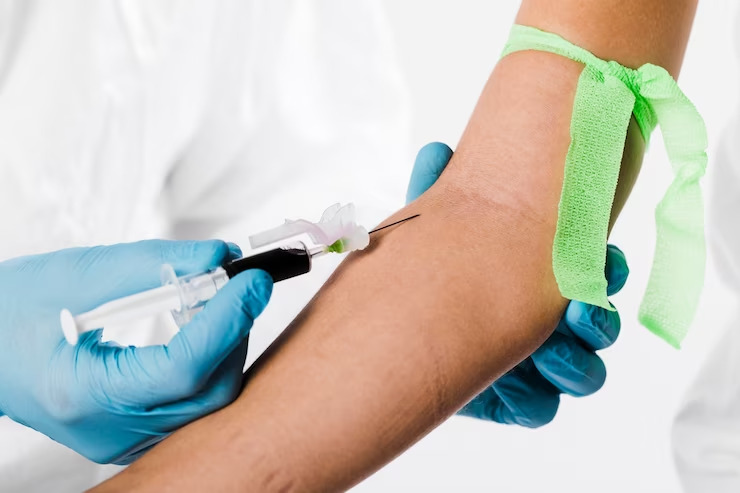Preventive Healthcare
T4 (Thyroxine) Test: Uses, Procedure, Risks And Result
2091 Views
0

The T4 test is used to determine thyroid health and may be done individually or as part of a thyroid panel, which includes other tests. T4 or thyroxine is a hormone produced by the thyroid gland which influences several body functions, including growth and metabolism.
T4 is available in two forms–
- Free (not bound to proteins in the blood) and available for use by body tissues.
- Bound: Most of the T4 in the blood is bonded to proteins.
A total T4 test measures the free and bound T4 in the blood, whereas a free T4 test measures the free T4 in the blood. Since the free T4 is available for your body to use, this test is usually preferred over a total T4 test.
A T4 blood test helps diagnose thyroid conditions.
What Does T4 Do in The Body?
T4, thyroxine or tetraiodothyronine is one of the main hormones produced by the thyroid gland.
Your thyroid gland releases inactive T4, and organs like the liver and kidneys convert most of this T4 to T3(triiodothyronine), the active hormone that affects the body cells.
T3 and T4 together play a role in regulating many body functions, such as:
- Regulate the metabolic rat
- Digestion and heart function
- Brain development
- Muscle control
- Bone maintenance
What is a T4 Blood Test Called?
The T4 blood test is also called by other names–
- Thyroxine test
- Total T4 concentration
- Free T4 concentration
- Free T4 index
What is a T4 Test Used For?
The T4 test is used to evaluate if your thyroid is functioning normally. Undergoing a T4 test helps your doctor diagnose thyroid disease and monitor if your treatment is working.
A few conditions that are routinely diagnosed using a T4 test:
- Hypothyroidism: If you have hypothyroidism, your thyroid is underactive and does not make enough T3 or T4 to meet your body’s needs.
- Hyperthyroidism: If you have an overactive thyroid, it makes more hormones than your body needs.
- Pituitary gland disorders: The pituitary gland produces TSH (thyroid-stimulating hormone) which stimulates the thyroid to produce T3 and T4. TSH controls the amount of T4 produced by your thyroid gland. So, if your TSH test shows abnormal results, your doctor will prescribe a T4 test to diagnose if the problem is with the thyroid or the pituitary gland.
Why Do You Need a T4 Test?
A T4 test is recommended if you have a family history of a thyroid condition or are experiencing one or more signs of abnormal levels of thyroid hormones.
A few common symptoms of hypothyroidism include:
- Weight gain
- Dry skin
- Fatigue
- Dry and thinning hair
- Increased sensitivity to cold temperatures
- Irregular menstrual cycle
- Fertility issues
- Slow heart rate
- Depression
Some symptoms of hyperthyroidism include:
- Anxiety or nervousness
- Irritability
- Increased appetite with weight loss
- Hand tremors
- Muscle weakness
- Arrhythmia
- Increased frequency of bowel movements
- Enlarged thyroid gland (goitre)
- Difficulty in sleeping
- Chronic fatigue
These signs indicate that your thyroid may not be working normally, so your doctor may order a T4 test.
How Do You Prepare For The T4 Test?
Usually, you will not need any special preparations before a T4 blood test. Since a few medications and supplements may affect your test results, you need to stop taking them before your test. Inform your doctor about any medicines you may be taking. Do not stop taking medications without talking to your doctor. Inform your doctor if you are pregnant.
A few medications that may affect T4 levels include:
- Hormonal drugs
- Medications that are used to treat thyroid conditions
- Steroids
- Anti-cancer drugs
What Happens During a T4 Test?
A T4 test is a blood test. For your test, you will be asked to sit on a chair, and the phlebotomist or healthcare provider will take a blood sample from a vein in your arm. A small needle attached to a test tube or a vial is inserted into the vein, and a small quantity of blood is collected. The entire procedure takes less than five minutes.
What Do The T4 Test Results Mean?
The normal values for T4 are:
- Total T4: Between 5.0 to 12.0 micrograms/dL
- Free T4: 0.8 to 1.8 micrograms/dL
The normal range of total and free T4 varies in children based on their age. Since T4 is not the only hormone produced by the thyroid, a normal T4 test result does not mean your thyroid is functioning normally.
When your T4 test levels lie outside the normal range, your doctor will evaluate your T3 and TSH levels to diagnose your condition.
Abnormally high T4:
Your T4 levels may be abnormally high in the case of hyperthyroidism. However, it may also indicate the following conditions:
- You have high protein levels in the blood
- Excess iodine
- An excess of thyroid replacement medication
- Trophoblastic disease
- Germ cell tumours
- A recent x-ray using iodine dye
- Thyroiditis
- Toxic multinodular goitre
Pregnancy can also affect your T4 levels. So, if you have abnormally high T4 levels and are pregnant, your doctor may recommend further testing.
Abnormally low T4:
If your T4 levels are lower than normal, it may indicate one of the following conditions:
- Hypothyroidism
- Medications that affect protein levels
- Dietary conditions like fasting
- Malnutrition
- Iodine deficiency
- Illness
- Pituitary condition
Are There Risks of a T4 Test?
There is little or no risk associated with a T4 test. However, some people may experience slight pain or bruising at the spot of the needle prick, which resolves by itself in a few hours.If you want to know more about your thyroid health, book your T4 test at Metropolis today!
 Home Visit
Home Visit Upload
Upload














1701259759.webp)









 WhatsApp
WhatsApp